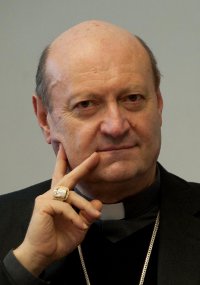The US Department of Defense has now listed Catholics and Evangelical Christians as religious extremists, that is, religious terrorists. Catholics and Evangelicals are now lumped in the same list as are the Muslim Brotherhood, Al-Qaeda, the KKK and Hamas.
Tag: secularism
Together in Christ

Image via Wikipedia
The Pope’s “Together in Christ” two day visit of Croatia was significant for several reasons. For him, and I think for all of us who were either physically in Zagreb or tuned via the media, time spent with the Croatians was monumental because it clearly exhibited the “dynamism of communion.” (What visit of a pope is insignificant, the wag asks?) In his own words, the Benedict reviews the events he and the world lived with him in this way:
- “the experience of finding ourselves together united in the name of Christ,
- the experience of being Church, which is manifested … around the Successor of Peter.
- ‘Together in Christ’ referred in a particular way to the family (… the occasion of my visit was the First National Day of Croatian Catholic Families…
It was very important for me to confirm in the faith especially these families that the Second Vatican Council called “domestic churches” (cf. Lumen Gentium, 11).
In today’s Europe [and one can extend this to the globe], nations with a strong Christian tradition have a special responsibility to defend and promote the value of the family founded on marriage, which remains decisive both within the field of education as well as in the social sphere.”
Court of the Gentiles –next step
Success is not a word that is appropriate for matters pertaining to faith, even if it’s dealing those hearing the message of the Gospel for the first time or fancy programs. But I think it’s fair to say that from the reports that are coming from the Court of the Gentiles last weekend, this event was extraordinarily successful. Cardinal Gianfranco Ravasi, his staff and collaborators have the makings of very significant work for culture, humanity and theology which will, no doubt, bear much fruit.
Court of the Gentiles –Le Parvis des Gentils à Paris: a call to fraternity to believers and nonbelievers to live coherent in Christ, and for a new humanity
 Cardinal Gianfranco Ravasi’s interview on the importance of the Court of the Gentiles for us. This is probably the single most significant initiative of the Pontifical Council for Culture taking seriously the place of belief and unbelief. The Pope some time ago asked the pastors of the Church to take atheism as a serious matter to engage in. And by atheism he’s not suggesting the Christopher Hitchens’ version of atheism but what might be called “honest atheism,” those who ask sincere questions of belief and who are seeking to live a coherent life. The Pope is brilliant in his call to respect, dialogue and living.
Cardinal Gianfranco Ravasi’s interview on the importance of the Court of the Gentiles for us. This is probably the single most significant initiative of the Pontifical Council for Culture taking seriously the place of belief and unbelief. The Pope some time ago asked the pastors of the Church to take atheism as a serious matter to engage in. And by atheism he’s not suggesting the Christopher Hitchens’ version of atheism but what might be called “honest atheism,” those who ask sincere questions of belief and who are seeking to live a coherent life. The Pope is brilliant in his call to respect, dialogue and living. I know that at the invitation of Cardinal André Vingt-Trois, the Archbishop of Paris, and of Cardinal Gianfranco Ravasi (seen right), the President of the Pontifical Council for Culture, you are gathered in great numbers in front of the Cathedral of Notre Dame in Paris. I greet all of you, together with our brothers and friends from the Taizé Community. I am grateful to the Pontifical Council for having taken up and extended my invitation to open a number of “Courts of the Gentiles” within the Church. This image refers to the vast open space near the Temple of Jerusalem where all those who did not share the faith of Israel could approach the Temple and ask questions about religion. There they could meet the scribes, speak of faith and even pray to the unknown God. The Court was then an area of separation, since Gentiles did not have the right to enter the consecrated area, yet Jesus Christ came to “break down the dividing wall” between Jews and Gentiles, and to “reconcile both to God in one body through the cross, thus putting to death that hostility in himself”. In the words of Saint Paul, “He came and proclaimed peace…” (cf. Eph 2:14-17).
I know that at the invitation of Cardinal André Vingt-Trois, the Archbishop of Paris, and of Cardinal Gianfranco Ravasi (seen right), the President of the Pontifical Council for Culture, you are gathered in great numbers in front of the Cathedral of Notre Dame in Paris. I greet all of you, together with our brothers and friends from the Taizé Community. I am grateful to the Pontifical Council for having taken up and extended my invitation to open a number of “Courts of the Gentiles” within the Church. This image refers to the vast open space near the Temple of Jerusalem where all those who did not share the faith of Israel could approach the Temple and ask questions about religion. There they could meet the scribes, speak of faith and even pray to the unknown God. The Court was then an area of separation, since Gentiles did not have the right to enter the consecrated area, yet Jesus Christ came to “break down the dividing wall” between Jews and Gentiles, and to “reconcile both to God in one body through the cross, thus putting to death that hostility in himself”. In the words of Saint Paul, “He came and proclaimed peace…” (cf. Eph 2:14-17).
